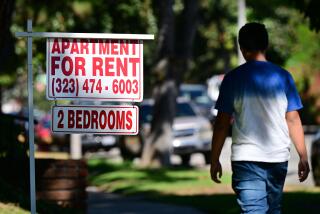Southland housing market stagnant in February
The Southern California housing market is stuck in neutral, raising questions over whether the recovery will pick up this spring.
Home prices stayed essentially flat in February while sales tumbled, research firm DataQuick reported Wednesday. Buyers continued to hold back even as more homes trickled onto the market. No one’s predicting a new slump, but some experts believe the market has hit a plateau.
“I think this year will be flat as a pancake,” said Leo Nordine, a real estate agent in Redondo Beach.
The median sales price in the six-county region inched up 0.8% from January to $383,000, DataQuick said. Sales plunged 12% compared with the same month last year, and were lower than any February since 2008.
Year-over-year sales have now fallen for five straight months, in part because investors who flooded the market last year have pulled back.
Prices have stayed essentially flat since June. They remain 19.7% higher than February 2013, reflecting the rapid run-up in prices during the first half of last year.
For the market to move again, first-time home buyers and families looking to trade-up need to come off the sidelines. But experts are divided on whether they’ll do that in this still-weak economy.
Many market watchers see stable prices, but no growth. Homes sell quickly, but there aren’t many to choose from. And buyers are still struggling with high prices and an uptick in interest rates.
“We’ve basically run out of houses that people can afford,” said Richard Green, director of USC’s Lusk Center for Real Estate. “Three or four years ago, if you were a family making $60,000 there was plenty of stuff you could buy in Southern California. That’s gone.”
The shortage of homes has eased slightly. Listings in the Inland Empire, for instance, were up 30% compared with a year ago, according to Realtor.com. But inventory remains tight throughout the region.
Many buyers are held back by high prices, said Esmael Adibi, director of Chapman University’s A. Gary Anderson Center for Economic Research.
“That is one reason that price appreciation is going to be very moderate,” he said.
Leo Nordine agrees. The Redondo Beach agent sees a few hot spots that are booming — tech industry hubs on the Westside, for instance, or neighborhoods popular with foreign buyers in the San Gabriel Valley — but a broader economy that’s still weak for most people. Until that changes, he predicts, the housing market will stay sluggish across the Southland.
“I don’t really see prices going up. I don’t see move-up buyers,” he said. “I’d love to be wrong, but I’m just not seeing it.”
Others are more bullish.
Syd Leibovitch, president of Rodeo Realty, predicts a busy spring. More homes have come on the market, he said, and some are selling well above asking price.
The demand influx started later this year than last, he said.
“But it is starting. And it seems to be starting big time.”
Christopher Thornberg, founding partner at Beacon Economics, sees the region’s economy improving. California’s population grew at its fastest clip in a decade last year, according to state estimates. Just in January in Los Angeles and Orange counties, employers added more than 30,000 jobs, according to Beacon’s seasonal adjustments.
That will soon translate into more demand for housing from more traditional buyers.
“You’re starting to see a turnaround in demand for homeownership,” he said. “You’ll see the market shift away from investor buyers and toward retail buyers. We’re just in this soft spot right now.”
One reason is that investors are backing off as higher prices make their bets less attractive. Absentee buyers, mostly investors, accounted for 29% of home sales in February, according to DataQuick, down from 32.3% the same month a year earlier.
That could create breathing room for families, who last year often lost out to all-cash offers from investors. But buyers are being choosy. Real estate agent Grace Mitnick said she’s seen more families home shopping recently. But they are more cautious than last year, when many rushed to submit competing bids.
“They don’t want to settle,” she said.







